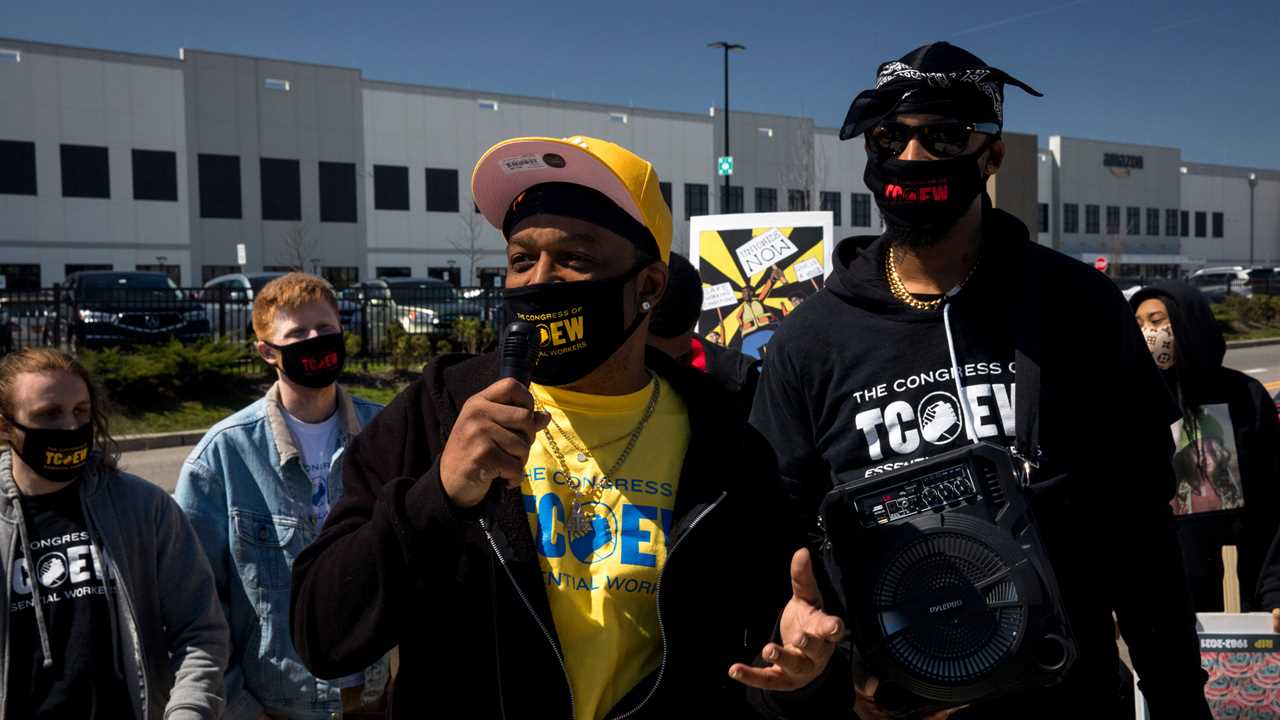
A judge ruled on Monday that Amazon must reinstate and pay lost wages to a worker the company “unlawfully” fired two years ago after a protest at its fulfillment center on Staten Island, the same warehouse that recently voted in a landmark election to unionize.
A National Labor Relations Board regional director argued that the firing was retaliation for protesting safety conditions, which is protected by federal labor law. Benjamin W. Green, an administrative law judge, agreed.
The case centers on a verbal altercation during the early days of the pandemic in New York. On April 6, 2020, Gerald Bryson was protesting outside the warehouse, known as JFK8, and said it should be shut down for safety. Another employee said she wanted the facility to remain open because she was grateful for the extra pay she was receiving for working during the pandemic. The two exchanged insults, but only Mr. Bryson was fired. The woman received a written warning.
“For me to win and walk back through those doors changes everything,” Mr. Bryson said in an interview Monday. “It will show that Amazon can be beat. It will show you have to fight for what you believe in.”
Amazon has said Mr. Bryson was fired for violating its policy against vulgar and harassing language. It has defended its actions by pointing to an internal investigation it conducted and arguing that the punishment was consistent with how other workers were treated.
“We strongly disagree with this ruling and are surprised the N.L.R.B. would want any employer to condone Mr. Bryson’s behavior,” Kelly Nantel, a company spokeswoman, said in a statement. “Mr. Bryson was fired for bullying, cursing at and defaming a female co-worker over a bullhorn in front of the workplace.”
She added, “We do not tolerate that type of conduct in our workplace and intend to file an appeal with the N.L.R.B.”
Mr. Green, the judge, knocked Amazon’s key justifications for the dismissal. He said Amazon’s investigation had been “skewed” and designed to find reasons to fire Mr. Bryson for his protest. Noting that Amazon did not interview a protester who had recorded the argument, the judge wrote that Amazon “preferred not to obtain information from someone who was protesting with Bryson even though that person was likely in the best position to explain what happened.”
He also doubted the statements of the managers and other employees whom Amazon did interview. Amazon, for example, documented that the woman, who is white, and a manager had said Mr. Bryson called her a racial slur during the altercation. But a video of the encounter showed that never happened. The woman told Mr. Bryson, who is Black, to “go back to the Bronx,” which the judge said Mr. Bryson could reasonably construe as being “racial.”
“I find it implausible that six individuals would view the argument and coincidentally provide these one-sided, exaggerated accounts unless such accounts were solicited from them,” he wrote.
Mr. Bryson, who celebrated the ruling with his 9-year-old son, said he was glad the judge had found that some of Amazon’s public statements about him were not valid. “I really feel they damaged my name over two years for nothing,” he said.
Amazon justified the firing by saying other employees at the facility had been fired for similar behavior, but the judge disagreed. He said Amazon’s records indicated lesser punishment “for conduct more threatening than that of Bryson or which involved physical touching.” None of the examples involved incidents outside the facility on unpaid time, he added.
Mr. Green also found that Amazon did not produce all of the documents asked for in a subpoena. He said Amazon must post notices inside the warehouse affirming the right for workers to form a union and publicly acknowledging the remedies it must take.
“This is a very stern rebuke of Amazon’s unlawful, retaliatory termination of Gerald,” said Frank Kearl, a lawyer with Make the Road New York, a progressive advocacy group that represented Mr. Bryson.
Amazon had fought the case at the labor agency and in federal court. To examine a witness in hearings last year, Amazon hired Zainab Ahmad, a lawyer at Gibson, Dunn & Crutcher and a former federal prosecutor who had tried cases against terrorists.
In a related proceeding, the labor board sued Amazon in federal court last month, asking a judge to order the company to reinstate Mr. Bryson because otherwise its “serious flouting” of the protections would “continue unchecked.” That case is still in progress.
Amazon argued that the labor agency showed bias when it asked the federal judge intervene just before the union election at JFK8. The company has cited Mr. Bryson’s case as a key reason the union’s victory should be thrown out.
The Amazon Labor Union, which won the vote at JFK8, is facing a second vote at a neighboring warehouse at the end of April.
Mr. Bryson, who is active in the union, said the ruling bolstered the case it was making to workers. “I am there to say, ‘Listen, I just battled with them for two years and won,’” he said.
Amazon’s appeal of Monday’s ruling would go to the five-member board of the agency. If it loses there, it can challenge the result in federal court.
Did you miss our previous article...
https://trendinginthenews.com/tech-giants/the-battery-that-flies






